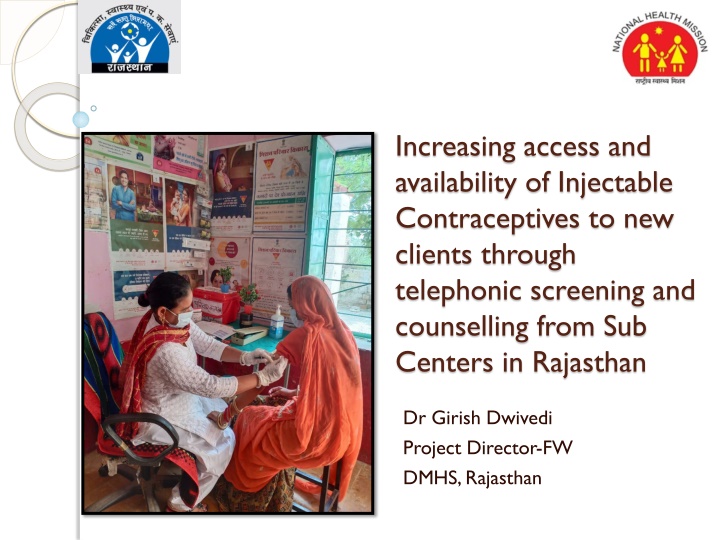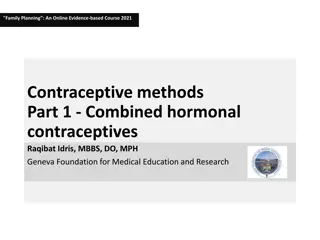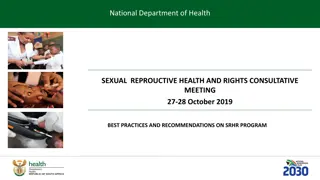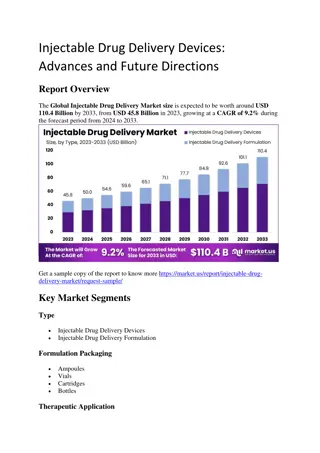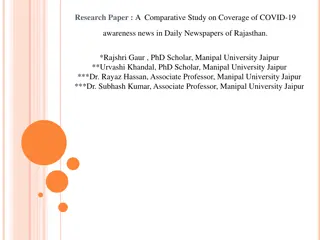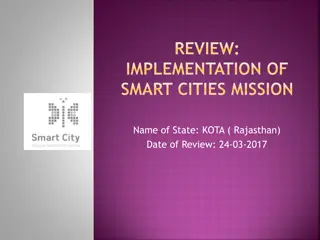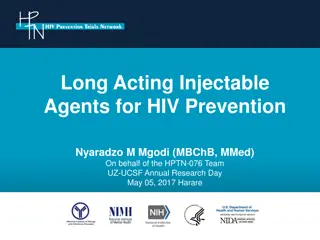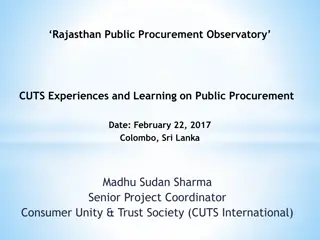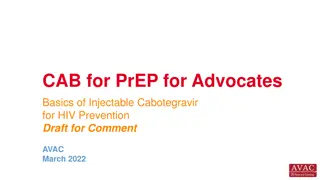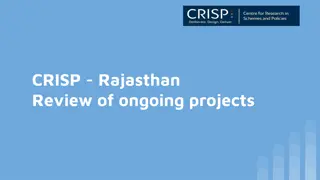Increasing Access to Injectable Contraceptives in Rajasthan
"Project aims to enhance availability of injectable contraceptives through telephonic screening and counseling, addressing unmet needs exacerbated by COVID-19. Innovative approach allows trained ANMs to provide first dose, reducing burden on higher health centers and ensuring continuity of family planning services. Impact data reflects significant changes in uptake and distribution during the pandemic, highlighting the importance of adapting services to meet evolving challenges."
Download Presentation

Please find below an Image/Link to download the presentation.
The content on the website is provided AS IS for your information and personal use only. It may not be sold, licensed, or shared on other websites without obtaining consent from the author.If you encounter any issues during the download, it is possible that the publisher has removed the file from their server.
You are allowed to download the files provided on this website for personal or commercial use, subject to the condition that they are used lawfully. All files are the property of their respective owners.
The content on the website is provided AS IS for your information and personal use only. It may not be sold, licensed, or shared on other websites without obtaining consent from the author.
E N D
Presentation Transcript
Increasing access and availability of Injectable Contraceptives to new clients through telephonic screening and counselling from Sub Centers in Rajasthan Dr Girish Dwivedi Project Director-FW DMHS, Rajasthan
Background Impact of COVID-19 on health system: Entire health system and staff was busy in containing/managing COVID-19. It affected the systems ability to provide regular family planning services. All elective surgeries, including sterilization services were almost stopped. There was an increase in unmet need for contraceptives as: Clients were unable to seek family planning services due to stringent restriction on movement. Reluctance to visit health facilities due to fear of COVID-19. Many migrant workers had returned to their homes, which resulted in increased demand for contraception.
Impact of COVID-19 on Family Planning Services during lockdown Performance Apr-May (2019-20) Apr-May (2020-21) % change Female Sterilization 44170 2878 -93.5 Male sterilization 413 16 -96.1 Interval IUCD Inserted 41028 20810 -49.3 PPIUCD inserted 36526 29310 -19.8 PAIUCD inserted 640 465 -27.3 Total Injectable doses 33540 27046 -19.4 Condom Distributed 5327510 4716403 -11.5 Mala N Distributed 533074 475415 -10.8
Impact on uptake of Injectable Contraceptives uptake April-May 2019 15338 10404 4745 April-May 2020 9004 8453 4209 Change Doses Injectable Contraceptive- First Dose Injectable Contraceptive-Second Dose Injectable Contraceptive-Third Dose Injectable Contraceptive-Fourth or more than fourth -6334 -1951 -536 3053 5380 2327 Access of injectable contraceptives to new clients was severely restricted as GoI guidelines only allow a trained doctors to give first dose after proper screening of client. Clients were able to get subsequent doses as the same can also be given from trained ANMs from sub centers
Innovation To address unmet need for contraceptives arised due to COVID-19, state decided to focus on Injectable Contraceptives due to following reasons: It is long terms (3 months) reversible contraceptives and highly effective (99.7%-perfect use). It can easily be provided by trained ANMs from sub centers reducing unnecessary burden to higher health centers. Also reducing clients travel time and unnecessary exposure from higher health facilities. State decided to allow trained ANMs to provide first dose of injectable contraceptives to new clients, but telephonic screening of client by a trained medical officer was made mandatory. Detailed guidelines for the same developed in consultation of UNFPA
Dissemination of Guidelines an Preparations An official order was issued to districts in this regard (Letter No 10 dated 04.05.2020). An virtual meeting was organized of district level officials under the Chairpersonship of Director (RCH) to orient them about guidelines for telephonic counselling and screening. Checklist for screening of Antara clients was already developed and supplied with support of UNFPA
Steps of Providing 1st dose of Injectable Contraceptives from sub centers New client contact sub centers for seeking injectable contraceptive services ANM will welcome the client and call a trained Medical Officer for counseling and screening of client Medical officer will counsel the client and screen her using a standard checklist Client is not eligible for injectable contraceptives: Medical officer will counsel her about other suitable contraceptives ask the ANM to provide her selected contraceptive Client is eligible for injectable contraceptives: Medical officer will ask the ANM to administer injectable contraceptive to the client
Impact June- July 2020 20852 8312 5831 June- July-19 Change Doses Injectable Contraceptive- First Dose Injectable Contraceptive-Second Dose Injectable Contraceptive-Third Dose Injectable Contraceptive-Fourth or more than fourth 16659 8589 6434 4193 -277 -603 3768 6790 3022 Significant improvement in clients new clients of Injectable contraceptives in subsequent months. Additional 4193 clients were served compared to same period last year. Total 10083 new clients have been provided injectable contraceptive services from sub centers during April to Sep, 2020
Lessons Learnt Telephonic counselling and screening of clients is an effective approach to increase access and availability of injectable contraceptives to new clients. Screening checklists are good tool to standardise screening process. It can easily be replicated in other states.
